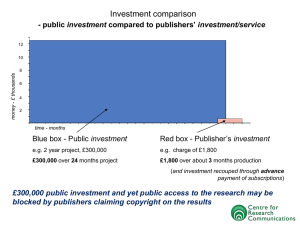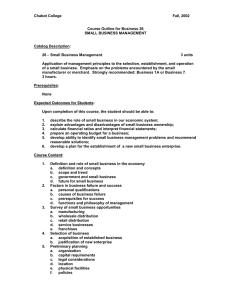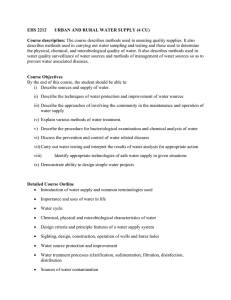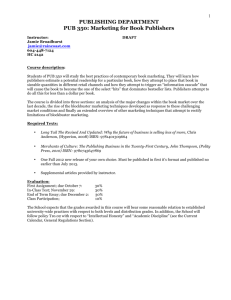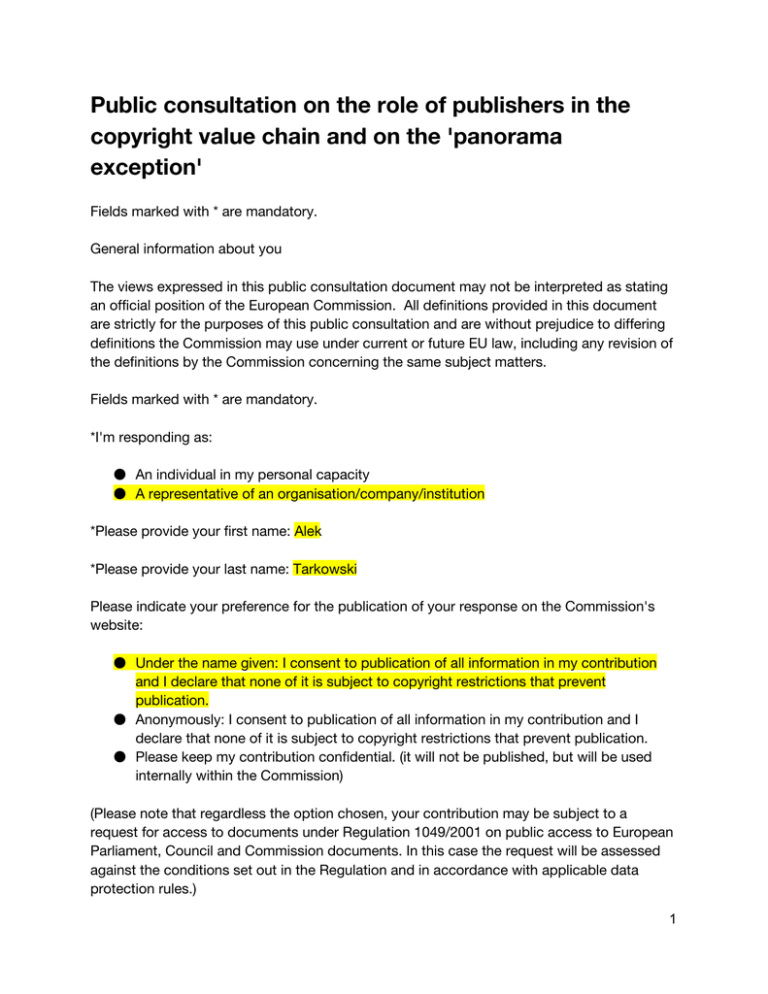
Public consultation on the role of publishers in the
copyright value chain and on the 'panorama
exception'
Fields marked with * are mandatory.
General information about you
The views expressed in this public consultation document may not be interpreted as stating
an official position of the European Commission. All definitions provided in this document
are strictly for the purposes of this public consultation and are without prejudice to differing
definitions the Commission may use under current or future EU law, including any revision of
the definitions by the Commission concerning the same subject matters.
Fields marked with * are mandatory.
*I'm responding as:
● An individual in my personal capacity
● A representative of an organisation/company/institution
*Please provide your first name:
Alek
*Please provide your last name:
Tarkowski
Please indicate your preference for the publication of your response on the Commission's
website:
● Under the name given: I consent to publication of all information in my contribution
and I declare that none of it is subject to copyright restrictions that prevent
publication.
● Anonymously: I consent to publication of all information in my contribution and I
declare that none of it is subject to copyright restrictions that prevent publication.
● Please keep my contribution confidential. (it will not be published, but will be used
internally within the Commission)
(Please note that regardless the option chosen, your contribution may be subject to a
request for access to documents under Regulation 1049/2001 on public access to European
Parliament, Council and Commission documents. In this case the request will be assessed
against the conditions set out in the Regulation and in accordance with applicable data
protection rules.)
1 *Please indicate your country of residence
Austria
Belgium
Bulgaria
Croatia
Cyprus
Czech Republic
Denmark
Estonia
Finland
France
Germany
Greece
Hungary
Italy
Ireland
Latvia
Lithuania
Luxembourg
Malta
Netherlands
Poland
Portugal
Romania
Slovakia
Slovenia
Spain
Sweden
United Kingdom
Other
*If other, please specify
*Please enter the name of your institution/organisation/business.
COMMUNIA International Association on the public domain
*What is your institution/organisation/business website, etc.?
http://www.communia-association.org/
*What is the primary place of establishment of the entity you represent?
Austria
2 Belgium
Bulgaria
Croatia
Cyprus
Czech Republic
Denmark
Estonia
Finland
France
Germany
Greece
Hungary
Italy
Ireland
Latvia
Lithuania
Luxembourg
Malta
Netherlands
Poland
Portugal
Romania
Slovakia
Slovenia
Spain
Sweden
United Kingdom
Other
*If other please specify:
*My institution/organisation/business operates in: (Multiple selections possible)
Austria
Belgium
Bulgaria
Croatia
Cyprus
Czech Republic
Denmark
Estonia
Finland
France
Germany
3 Greece
Hungary
Italy
Ireland
Latvia
Lithuania
Luxembourg
Malta
Netherlands
Poland
Portugal
Romania
Slovakia
Slovenia
Spain
Sweden
United Kingdom
Other
*If other, please specify
*Is your organisation registered in the Transparency Register of the European Commission
and the European Parliament?
● Yes
● No
*Please indicate your organisation's registration number in the Transparency Register.
003277719548-45
If you are an entity not registered in the Transparency Register, please register before
answering this questionnaire. If your entity responds without being registered, the
Commission will consider its input as that of an individual and as such, will publish it
separately.
The role of publishers in the copyright value chain
In its Communication Towards a modern, more European copyright framework of 9
December 2015, the Commission has set the objective of achieving a well-functioning
market place for copyright, which implies, in particular, "the possibility for right holders to
license and be paid for the use of their content, including content distributed online."[1]
4 Further to the Communication and the related stakeholders' reactions, the Commission
wants to gather views as to whether publishers of newspapers, magazines, books and
scientific journals are facing problems in the digital environment as a result of the current
copyright legal framework with regard notably to their ability to licence and be paid for online
uses of their content. This subject was not specifically covered by other public consultations
on copyright issues the Commission has carried out over the last years. In particular the
Commission wants to consult all stakeholders as regards the impact that a possible change
in EU law to grant publishers a new neighbouring right would have on them, on the whole
publishing value chain, on consumers/citizens and creative industries.[2] The Commission
invites all stakeholders to back up their replies, whenever possible, with market data and
other economic evidence. It also wants to gather views as to whether the need (or not) for
intervention is different in the press publishing sector as compared to the book/scientific
publishing sectors. In doing so, the Commission will ensure the coherence of any possible
intervention with other EU policies and in particular its policy on open access to scientific
publications.[3]
*Selection
Do you wish to respond to the questionnaire "The role of publishers in the copyright value
chain"?
● Yes (Please allow for a few moments while questions are loaded below)
● No
Category of respondents
*Please choose the category that applies to your organisation and sector.
● Member State
● Public authority
● Library/Cultural heritage institution (or representative thereof)
● Educational or research institution (or representative thereof)
● End user/consumer/citizen (or representative thereof)
● Researcher (or representative thereof)
● Professional photographer (or representative thereof)
● Writer (or representative thereof)
● Journalist (or representative thereof)
● Other author (or representative thereof)
● Collective management organisation (or representative thereof)
● Press publisher (or representative thereof)
● Book publisher (or representative thereof)
● Scientific publisher (or representative thereof)
● Film/audiovisual producer (or representative thereof)
● Broadcaster (or representative thereof)
● Phonogram producer (or representative thereof)
● Performer (or representative thereof)
● Advertising service provider (or representative thereof)
5 ●
●
●
●
●
●
Content aggregator (e.g. news aggregators, images banks or representative thereof)
Search engine (or representative thereof)
Social network (or representative thereof)
Hosting service provider (or representative thereof)
Other service provider (or representative thereof)
Other
If other service provider, please specify
If other, please specify
Non-profit organisation advocating for a strong public domain to benefit users, creators,
educators, researchers, and cultural heritage institutions
Questions
1. On which grounds do you obtain rights for the purposes of publishing your press or
other print content and licensing it? (Multiple selections possible)
● transfer of rights from authors
● licensing of rights from authors (exclusive or non-exclusive)
● self-standing right under national law (e.g. author of a collective work)
● rights over works created by an employee in the course of employment
● not relevant
● other
If other, please specify
Please explain
2. Have you faced problems when licensing online uses of your press or other print
content due to the fact that you were licensing or seeking to do so on the basis of
rights transferred or licensed to you by authors?
● yes, often
● yes, occasionally
● hardly ever
● Never
● no opinion
● not relevant
If so, please explain what problems and provide examples indicating in particular the
Member State, the uses you were licensing, the type of work and licensee.
6 3. Have you faced problems enforcing rights related to press or other print content
online due to the fact that you were taking action or seeking to do so on the basis of
rights transferred or licenced to you by authors?
● yes, often
● yes, occasionally
● hardly ever
● Never
● no opinion
● not relevant
If so, please explain what problems and provide examples indicating in particular the
Member State, the type of use and the alleged infringement to your rights.
4. What would be the impact on publishers of the creation of a new neighbouring right
in EU law (in particular on their ability to license and protect their content from
infringements and to receive compensation for uses made under an exception)?
● strong positive impact
● modest positive impact
● no impact
● modest negative impact
● strong negative impact
● no opinion
Please explain
Creating a new neighbouring right for publishers would have a strong negative impact on
many publishers as it would be an unnecessary and often unwanted right that they have to
deal with. The demands for additional rights come from a relatively small number of
traditional publishers who by no means represent the wide variety of active publishers.
Business models among publishing entities vary a great deal, and there is an increasing
number of publishers that publish without the expectation of having exclusive control over
their publications (memes, viral content, etc.), or who publish using open content licenses.
Depending on how additional rights will be implemented, creating new rights will make it
harder for publishers to grow and develop innovative business models.
There are a number of examples where neighbouring rights negatively affect the ability to
publish works under open licenses. In many EU member states the implementation of the
neighbouring right for performers as a remuneration right undermines their ability to share
works under Creative Commons licenses, and the Spanish ancillary copyright for press
publishers has also limited the freedom of Spanish press publishers to allow free uses of
their works.
7 The above is even more problematic as new rights for publishers are unnecessary because
publishers can avail themselves to the protections already provided by copyright. A new right
for publishers would only make sense if it covered uses not already protected by copyright,
or not subject to the same exceptions and limitations to copyright. In both cases this would
result in a substantial limitation of access to information, which would be detrimental to
society as a whole.
Finally, the experiences with ancillary copyrights for press publishers in both Spain and
Germany have illustrated that granting additional rights does not result in increased revenues
for publishers. Instead, it can result in decreased visibility and findability of publishers’
content, which in return leads to a decrease in revenues, as shown in the study on the
impact of the introduction of ancilliary rights for publishers in Spain, commissioned by the
Asociación Española de Editoriales de Publicaciones Periódicas, available at
http://www.aeepp.com/pdf/InformeNera.pdf
.
5. Would the creation of a new neighbouring right covering publishers in all sectors
have an impact on authors in the publishing sector such as journalists, writers,
photographers, researchers (in particular on authors' contractual relationship with
publishers, remuneration and the compensation they may be receiving for uses made
under an exception)?
● strong positive impact
● modest positive impact
● no impact
● modest negative impact
● strong negative impact
● no opinion
Please explain
The adoption of a new neighboring right covering publishers in all sectors would have
significant negative consequences for authors in the publishing sector. As we have outlined
above, such a right will likely have strong negative impact on the publishing sector which will
negatively affect the entire ecosystem—including authors.
In addition, authors can be limited by secondary effects of the new rights that will make it
more difficult to locate, access and re-use existing information online.
Finally, a new right could (and likely will) be used by publishers to claim a share of private
copy levies, which will have a direct negative impact on the revenues authors receive based
on such levies.
Given the above, a right covering all sectors would be much worse than a right covering only
press publishers.
8 6. Would the creation of a neighbouring right limited to the press publishers have an
impact on authors in the publishing sector (as above)?
● strong positive impact
● modest positive impact
● no impact
● modest negative impact
● strong negative impact
● no opinion
Please explain
The adoption of a new neighboring right limited to press publishers would have significant
negative consequences for authors. Journalists rely on a wide ranging set of tools and
practices to gather information to do their reporting, including news aggregators, services
like Google Alerts, and social media. Journalists would encounter additional hurdles in
finding and using news and information they need to do their jobs. Authors would find that
these existing news products and services will likely be disrupted, their prices increased, or
even discontinued altogether.
In addition, an ancillary copyright for press publishers would run afoul of the intentions of
creators who wish to share without additional strings attached because the right could be
interpreted as unwaivable. For example, the Spanish ancillary right did not treat
openly-licensed content differently from content under all rights reserved copyright. Content
publishers sharing under Creative Commons licenses, which is increasingly popular, would
still be subject to the ancillary copyright. If the right is unwaivable, aggregators would be
required to pay fair remuneration to a collective rights management organisation even if a
creator has chosen to apply a Creative Commons license that allows the free reuse of her
creation.
Authors don't appear to have benefitted from the previous experiments where a publisher’s
right has been adopted. We know of no evidence showing any connection between a
publisher’s right and an increase in the author's income. Instead, Google shuttered its
Google News operation in Spain, meaning that less traffic was directed to the publisher’s
content, and by extension, less income would be directed to the authors (if they authors get
anything in the first place). In Germany, publishers granted Google a free license to include
their content in the Google News product, so we assume there was no additional
compensation available for authors.
7. Would the creation of a new neighbouring right covering publishers in all sectors
have an impact on rightholders other than authors in the publishing sector?
● strong positive impact
● modest positive impact
9 ●
●
●
●
no impact
modest negative impact
strong negative impact
no opinion
Please explain
As we have outlined above, the adoption of a new neighboring right covering publishers in all
sectors would have significant negative consequences for all types of rights holders. Today,
with digital technologies and the web, anyone can be a creator and share content online.
There is no evidence that an additional right will offer any measurable benefits to any
participant in the publishing ecosystem. Instead, creating a new right will make rights
clearance more burdensome for anyone interested in re-using existing content, and
complicate an already overly complex copyright system. Given this, a right covering all
sectors would be much worse than a right covering only press publishers.
8. Would the creation of a neighbouring right limited to the press publishers have an
impact on rightholders other than authors in the publishing sector?
● strong positive impact
● modest positive impact
● no impact
● modest negative impact
● strong negative impact
● no opinion
Please explain
As outlined in the response to the previous question, the adoption of a new neighboring right
limited to publishers would have significant negative consequences for all types of rights
holders.
9. Would the creation of a new neighbouring right covering publishers in all sectors
have an impact on researchers and educational or research institutions?
● strong positive impact
● modest positive impact
● no impact
● modest negative impact
● strong negative impact
● no opinion
Please explain
10 The adoption of a new neighboring right limited to press publishers would have significant
negative consequences for researchers and educational or research institutions primarily by
increasing the complexity of an already overly complex copyright system. Adding an
additional (unnecessary) layer of rights will make it more difficult for educators and
researchers to understand how they can use content as part of their education and research
activities. If a newly created neighbouring right would be used to limit the use of snippets
and the aggregation of content this would have far reaching consequences on the ability of
researchers to access online content and the ability of educators to share online content with
their students
Exceptions for education are complex, fragmented, and oftentimes outdated, making it
difficult for educators and students to determine how they can use copyright-protected
materials as part of their educational activities. They fail to cover new digital and online uses,
as well as more traditional activities. For instance, as part of their educational activities,
schools and teachers have to prepare compilations of materials for educational purposes.
Those compilations are often made through the use of links to all types of online resources,
including resources produced by the press.
Educational repositories, blogs run by teachers, online encyclopedias, and dictionaries all
collect and share links to third party resources, and some even contain small snippets of text
written by those providers. With a new neighboring right for press publishers, educators and
researchers would be further limited in how they may use content for teaching and learning.
It could also increase costs to institutions for licensing fees, and even exacerbate the
increasing disparity in the quality of education provided across member states.
In addition, a new publisher’s right would run afoul of the intentions of creators who wish to
share without additional strings attached because the right could be interpreted as
unwaivable. For example, the Spanish ancillary right did not treat openly-licensed content
differently from content under all rights reserved copyright. Content publishers sharing under
Creative Commons licenses—for example contributions to Wikipedia—could still be subject
to the ancillary copyright.
10. Would the creation of a neighbouring right limited to press publishers have an
impact on researchers and educational or research institutions?
● strong positive impact
● modest positive impact
● no impact
● modest negative impact
● strong negative impact
● no opinion
Please explain
11 As we’ve argued above, the adoption of a new neighboring right covering publishers in all
sectors would have significant negative consequences for researchers and educational or
research institutions. Limiting the right to only press publishers does not solve the
fundamental problems such a right would create.
11. Would the creation of new neighbouring right covering publishers in all sectors
have an impact on online service providers (in particular on their ability to use or to
obtain a licence to use press or other print content)?
● strong positive impact
● modest positive impact
● no impact
● modest negative impact
● strong negative impact
● no opinion
Please explain
The adoption of a new neighboring right covering publishers in all sectors would have
significant negative consequences for online service providers. Creating a new right means
that licensing and rights clearance will be more complex and burdensome. It is a relatively
well established fact that the complexity of rights clearance is an important barrier for entry
for new online service providers and adding additional right to the mix will only make this
situation worse.
Depending on how such a new right would be implemented, it could also have far reaching
consequences for online service providers that build on openly licensed content.
Implementation as a remuneration right or via compulsory collective management would
undermine or destroy business models that build on open content.
In addition, such a new right would also negatively affect cultural heritage institutions and
aggregation platforms such as
Europeana.eu
, who are already suffering from the complexity
of rights and the costs of rights clearance.
These risks are not merely theoretical. The French legislature is in the process of introducing
a new right that would require search engines and indexing services to pay royalties for the
use of thumbnail images of copyright-protected works
(
http://www.senat.fr/amendements/commissions/2015-2016/15/Amdt_COM-182.html
).
According to the proposal (which is currently being deliberated in the French Senate), this
new right would be managed by one or more collecting societies, regardless of the intention
of the rightholders whether to be financially compensated for the use of their works by
search engines.
12 If implemented, the new right would apply to all kinds of online intermediaries, including
public services like
Europeana.eu
. It would likely force search engines of all types to
discontinue the use of thumbnail previews.
Copyright should not cover de minimis uses of copyrighted works—such as the appearance
of thumbnails or snippets in search results. Just because it’s technically possible to
negotiate a license for every piece of digital content does not mean that everything should be
licensed.
12. Would the creation of such a neighbouring right limited to press publishers have an
impact on online service providers (in particular on their ability to use or to obtain a
licence to use press content)?
● strong positive impact
● modest positive impact
● no impact
● modest negative impact
● strong negative impact
● no opinion
Please explain
As outlined in the response to the previous question, the adoption of a new neighboring right
limited to publishers would have significant negative consequences for online service
providers. Limiting the right to only press publishers does not solve the fundamental
problems such a right would create.
13. Would the creation of new neighbouring right covering publishers in all sectors
have an impact on consumers/end-users/EU citizens?
● strong positive impact
● modest positive impact
● no impact
● modest negative impact
● strong negative impact
● no opinion
Please explain
The adoption of a new neighboring right limited to press publishers would have significant
negative consequences for consumers/end-users/EU citizens. It frustrates end-users and
results in big content aggregators like Google News threatening to discontinue operations if
they would be required to pay royalties to publishers for linking to content or providing short
snippets to publishers’ content.
13 Users would encounter additional hurdles in finding the news and content they were looking
for. In addition, these users would potentially face more constraints in quoting, linking to,
aggregating, or otherwise finding and using works. Many users that rely on curated news
aggregators like Google News or even RSS readers or other apps that reproduce snippets of
content from news articles. If an additional right for press publishers is enacted, users would
find that these existing news products and services will likely be disrupted, their prices
increased, or even discontinued altogether (as we’ve seen in Spain with Google News).
A neighboring right for press publishers would have far reaching effects with regard to
access to information beyond the traditional new aggregation services. For example, popular
social networking apps and websites used by hundreds of millions of people could be
affected too. Think about sites like Facebook and Twitter that permit anyone to post links
and short pieces of text. Under a system where publishers are granted an additional right to
such snippets, those publishers would be able to extract fees from social networking sites
(who of course would likely pass on that cost to their users) in order to allow for open linking
to content.
14. Would the creation of new neighbouring right limited to press publishers have an
impact on consumers/end-users/EU citizens?
● strong positive impact
● modest positive impact
● no impact
● modest negative impact
● strong negative impact
● no opinion
Please explain
As outlined in the response to the previous question, the adoption of a new neighboring right
limited to publishers would have significant negative consequences for
consumers/end-users/EU citizens. Limiting the right to only press publishers does not solve
the fundamental problems such a right would create.
15. In those cases where publishers have been granted rights over or compensation for
specific types of online uses of their content (often referred to as "ancillary rights")
under Member States' law, has there been any impact on you/your activity, and if so,
what?
● strong positive impact
● modest positive impact
● no impact
● modest negative impact
● strong negative impact
● no opinion
14 Please explain, indicating in particular the Member State.
16. Is there any other issue that should be considered as regards the role of publishers
in the copyright value chain and the need for and/or the impact of the possible creation
of a neighbouring right for publishers in EU copyright law?
● Yes
● No
If so, please explain and whenever possible, please back up your replies with market data
and other economic evidence.
Adopting additional rights on top of a copyright system that is fundamentally broken is
neither contributing to the Commission's objective of modernizing the EU copyright
framework nor adapting it to the challenges of a fast-evolving digital environment. Creating
new rights (which are next to impossible to retract) is not a suitable method for managing the
relationship between different market segments and the public. The (online) publishing sector
is evolving at a rapid pace, and intervening in the relations with a static and blunt instrument
is expected to cause substantial collateral damage to education and access to knowledge.
COMMUNIA advocates for policies that expand the public domain and increase access to
and reuse of culture and knowledge. We seek to limit the scope of exclusive copyright to
sensible proportions that do not place unnecessary restrictions on access and use. We think
that granting any additional rights are problematic. The problem with copyright is not that
there are too few rights, but too many, and that these rights are overly broad and last for last
too long.
We advocate for the approach that de minimis usage of copyrighted works should not be
regulated. Use of snippets and thumbnails are examples of such use - overregulating of
access to copyrighted work results in limiting of access to information and knowledge.
Our opposition to creating additional rights for publishers is shared by the the European
parliament which twice voted against recommending additional rights for publisher as during
the deliberation on the evaluation report on the implementation of Directive 2001/29/EC on
the harmonisation of certain aspects of copyright and related rights in the information
society. In addition, 80 MEPs wrote a letter to the Commission opposing it (see:
http://www.communia-association.org/2015/12/18/83-meps-say-no-to-ancillary-copyright-in
-europe/
).
Finally it is worth highlighting again that while there is a strong lobby from many publishers
for introducing such a right, not all publishers are in favor. In December 2015 a coalition of
publishers wrote to the Commission in opposition to the introduction of a new right for
publishers (see
15 http://www.aeepp.com/pdf/151204_Statement_on_Digital_Single_Market_FINAL.pdf
). This
illustrates that professional publishers recognize that taxing the links that bring readers to
their sites is counterproductive to their businesses. In addition, bloggers, open access
publishers, and other authors who seek the widest possible dissemination of their content
would not be well-served by an publisher’s right.
Use of works, such as works of architecture or sculpture,
made to be located permanently in public places (the
'panorama exception')
EU copyright law provides that Member States may lay down exceptions or limitations to
copyright concerning the use of works, such as works of architecture or sculpture, made to
be located permanently in public places (the ‘panorama exception’) [1] . This exception has
been implemented in most Member States within the margin of manoeuvre left to them by
EU law.
In its Communication Towards a modern, more European copyright framework, the
Commission has indicated that it is assessing options and will consider legislative proposals
on EU copyright exceptions, among others in order to "clarify the current EU exception
permitting the use of works that were made to be permanently located in the public space
(the ‘panorama exception’), to take into account new dissemination channels.”[2]
This subject was not specifically covered by other public consultations on copyright issues
the
Commission has carried out over the last years. Further to the Communication and the
related
stakeholder reactions, the Commission wants to seek views as to whether the current
legislative framework on the "panorama" exception gives rise to specific problems in the
context of the Digital Single Market. The Commission invites all stakeholders to back up their
replies, whenever possible, with market data and other economic evidence.
*Selection
Do you wish to respond to this questionnaire "Use of works, such as works of architecture or
sculpture, made to be located permanently in public places (the 'panorama exception')?
● Yes (Please allow for a few moments while questions are loaded below)
● No
Category of respondents
*Please choose the category that applies to your organisation and sector.
● Member State
● Public authority
16 ● Owner or manager of works made to be located permanently in public places (or
representative thereof)
● Library or Cultural heritage institution (or representative thereof)
● Educational or research institution (or representative thereof)
● End user/consumer/citizen (or representative thereof)
● Visual artist (e.g. painter, sculptor or representative thereof)
● Architect (or representative thereof)
● Professional photographer (or representative thereof)
● Other authors (or representative thereof)
● Collective management organisation (or representative thereof)
● Publisher (or representative thereof)
● Film/audiovisual producer (or representative thereof)
● Broadcaster (or representative thereof)
● Phonogram producer (or representative thereof)
● Performer (or representative thereof)
● Advertising service provider (or representative thereof)
● Content aggregator (e.g. news aggregators, images banks or representative thereof)
● Search engine (or representative thereof)
● Social network (or representative thereof)
● Hosting service provider (or representative thereof)
● Other service provider (or representative thereof)
● Other
If other service provider, please specify
If other, please specify
Non-profit organisation advocating for a strong public domain to benefit users, creators,
educators, researchers, and cultural heritage institutions
Questions
1. When uploading your images of works, such as works of architecture or sculpture,
made to be located permanently in public places on the internet, have you faced
problems related to the fact that such works were protected by copyright?
● Yes, often
● Yes, occasionally
● Hardly ever
● Never
● No opinion
● Not relevant
17 If so, please explain what problems and provide examples indicating in particular the
Member State and the type of work concerned.
Please see our response in Question 7.
2. When providing online access to images of works, such as works of architecture or
sculpture, made to be located permanently in public places, have you faced problems
related to the fact that such works were protected by copyright?
● Yes, often
● Yes, occasionally
● Hardly ever
● Never
● No opinion
● Not relevant
If so, please explain what problems and provide examples indicating in particular the
Member State and the type of work concerned
Please see our response in Question 7.
3. Have you been using images of works, such as works of architecture or sculpture,
made to be located permanently in public places, in the context of your
business/activity, such as publications, audiovisual works or advertising?
● Yes, on the basis of a licence
● Yes, on the basis of an exception
● Never
● Not relevant
If so, please explain, indicating in particular the Member State and what business/activity,
and provide examples.
Please see our response in Question 7.
4. Do you license/offer licences for the use of works, such as works of architecture or
sculpture, made to be located permanently in public places?
● Yes
● No
● Not relevant
If so, please provide information about your licensing agreements (Member State, licensees,
type of uses covered, revenues generated, etc.)
Please see our response in Question 7.
18 5. What would be the impact on you/your activity of introducing an exception at the EU
level covering non-commercial uses of works, such as works of architecture or
sculpture, made to be located permanently in public places?
● strong positive impact
● modest positive impact
● no impact
● modest negative impact
● strong negative impact
● no opinion
Please explain
Please see our response in Question 7.
6. What would be the impact on you/your activity introducing an exception at the EU
level covering both commercial and non-commercial uses of works, such as works of
architecture or sculpture, made to be located permanently in public places?
● strong positive impact
● modest positive impact
● no impact
● modest negative impact
● strong negative impact
● no opinion
Please explain
Please see our response in Question 7.
7. Is there any other issue that should be considered as regards the 'panorama
exception' and the copyright framework applicable to the use of works, such as works
of architecture or sculpture, made to be permanently located in public places?
● Yes
● No
If so, please explain and whenever possible, please back up your replies with market data
and other economic evidence.
The sharing of photos taken in public places is an example of an everyday activity that
should not be regulated by copyright. We know that the lack of harmonization around the
freedom of panorama has negatively affected users who wish to share images of public
architecture and sculpture on sites like Wikipedia. Depending on where a particular user is
19 located, her work could be deleted from the site if her country’s copyright law does not
specifically permit the sharing of these images.
And the rules differ from country to country. Ireland, UK, Netherlands, Spain, Portugal, Malta,
Cyprus, Croatia, Hungary, Czech Republic, Slovakia, Austria, Germany, Poland and Sweden
have already implemented a broad exception for freedom of panorama that covers all uses,
including commercial. Bulgaria, Romania, Slovenia, Estonia, Lithuania and Latvia allow
sharing of images for non-commercial purposes only. Italy, Greece, Luxembourg, France,
Belgium don’t have any exception—which means they prohibit both commercial and
non-commercial sharing without permission from the rightsholder of the underlying work.
Finally, a few other countries only assert control over images of a particular media type. For
example, Denmark, Sweden, and Finland allow for photographs of buildings to be shared
freely, but restrict how images of sculptures can be used.
We think that a broad freedom of panorama should apply to both commercial and
noncommercial uses of images of architecture, sculpture, and other objects in public spaces.
Especially regarding user-generated content, is almost impossible to distinguish commercial
and non-commercial use. The exception should be mandatory across the EU, and should
cover both online and offline uses.
We also note that this issue was brought up in the discussion around the Reda report. An
amendment was introduced to restrict freedom of panorama to only non-commercial uses,
but a huge protest from citizens, photographers, and civil society organisations—including a
Change.org petition that received over 500,000 signatures—helped remove the amendment
from consideration.
20



